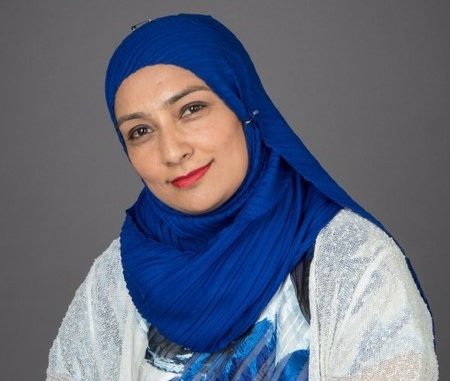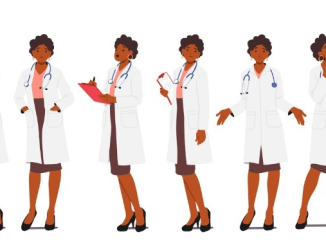
Dr Farzana Hussain is a high profile inner city single-handed GP working with three salaried doctors running a 5,000 patient practice in Newham, East London. She is clinical director for one of Newham’s ten Primary Care Networks (PCNs), which has responsibility for 67,000 patients, and is co-chair of the NHS Confederation’s National PCN Network
As an award-winning GP, she has been acknowledged for her work on quality improvement, streamlining patient appointment processes and work with pharmacists. Recently she was one of the faces of a special promotional campaign acknowledging the remarkable work of frontline NHS staff during the COVID-19 pandemic, to mark the NHS’ 72nd birthday.
Here, Dr Hussain offers a personal perspective of how delivery of primary care has evolved during the pandemic and also the importance of doctor-patient communications, supporting technology and the ongoing role of the telephone.
As a senior GP in Newham, East London, Dr Farzana Hussain is daily immersed in the challenges of delivering primary care in a deprived inner city – and that was before the additional health pressures of Covid-19 and its irreversible impact on the future shape of doctor-patient consultations.
Like countless colleagues throughout the UK, Dr Hussain, a high profile and award-winning GP, acknowledges that the pandemic has forced permanent changes to the way consultations are carried out.
As clinical director for one of Newham’s ten Primary Care Networks (PCNs) and co-chair of the NHS Confederation’s National PCN Network, she says she is very conscious of the need to continue to develop the ways in which primary care professionals communicate with patients. This is from the starting point of the phone being the key initial channel to support primary care.
Dr Hussain said: “As triage continues to develop as the care model, I would never now want to reverse how we deliver care with the focus going back to face to face appointments.”
Recently, GP leaders at the Royal College of General Practitioners (RCGP) sounded a cautionary note over Health Secretary Matt Hancock’s desire that unless there were good clinical reasons all consultations should be teleconsultations.
Professor Martin Marshall, chair of the RCGP, dismissed any move to a “totally, or even predominantly remote general practice service”. There were benefits in remote consultations but in many cases there needed to be physical examinations and vaccinations, and many patients valued GPs’ relationship-based care, he said.
Dr Hussain also has a more cautionary view. She said: “I think Matt Hancock’s idea of continuing remote working and digital solutions is fundamentally a good idea but I don’t think all consultations can be undertaken in this way. There will always be a need for face to face appointments, but I do believe this is on clinical need not want.”
Since the onset of the pandemic, she says her practice’s cloud-based telephone system, which is also used by two other practices in the total seven in the PCN region, has been crucial in keeping practices open. Such technology also offers flexibility for the future too.
She said: “When at least 50% of practice staff were isolating at home, it has enabled them to work remotely, with no impact on care quality. In our area, in theory it could help support a virtual partnership of practices. If for instance a GP friend in Merton, South West London, had no doctors one day, I could “jump” partnership if they’ve got the same telephony communications system, and do some of their calls, meaning they’ve still got capacity.”
With the rapid move to a “total triage” approach by general practice during the pandemic, supporting digital telephone systems have been vital. Many practices were ill-prepared though, did not have sophisticated supporting phone networks or were hampered by poor broadband connectivity.
During the COVID-19 pandemic, the phone system at Dr Hussain’s Newham practice has fully supported remote consultation.
She said: “For our patients who aren’t computer savvy, that’s fine as they can ring through on the phone. Our high risk patients can ring in as an emergency, and for most other patients if we can’t finish the consultation online then it goes to a telephone call. And then if we can’t work it out on the telephone, we’ll do a video consultation, and if we can’t sort the matter that way then we’ll do a face to face, but that has only really happened recently in the case of a patient with acute abdominal pains.
“Other than that, during the COVID-19 pandemic, my colleagues and I didn’t have a face-to-face appointment in four weeks. We just hadn’t needed to; if a patient looks that sick on the video call then you make an assessment as to whether they need an admission. I’d also challenge those who say that it’s not possible to take a view on a patient’s mental health from a video consultation.”
Dr Hussain saw the benefit of modern, versatile technology about six years ago when looking to upgrade practice communications, originally to help monitor call waiting times and provide consultation recording options to support doctor staff training and back-up in the event of medico-legal issues.
Access to call data has been invaluable in helping improve practice efficiency at all the practices in the Newham PCN using the Surgery Connect service from X-on. The level of data that is captured by the system helps show how easy or otherwise it is for patients to get through on the phone and how long they are waiting for.
She said: “There has been a big issue in Newham regarding patient access and satisfaction and one of our local practices had one of the worst scores in the country according to last year’s GP Patient Survey.
“I asked one of our practices if they thought they were providing enough patient access and they said they were as they had four doctors all doing emergency appointments. But my response was: ‘How do you know the demand that you are not seeing’, which was something they said they hadn’t thought about. So we don’t know what we’re not measuring – there are all these patients who could be trying to get our help and if we’re not measuring call volumes and access, we’re not aware of demand. Our phone service shows you when you have missed calls.”
It has also provided strong back-up for medical legal issues. Dr Hussain said: “We had a patient complaint that a doctor had refused to refer them to a neurologist and was threatening to get the doctor struck off. It was a serious complaint but we were able to listen to the recording of the relevant consultation, share it with the patient, prove what was actually said and resolve the matter – it was very supportive for our colleague and a powerful asset in managing the situation.”
Ahead of many of her peers in spotting how communications technology could enhance efficiency within her busy practice, Dr Hussain continues to ensure it remains a fundamental pillar in delivering effective care in a challenging London borough.


Be the first to comment